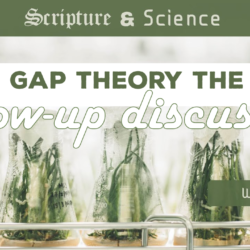This is part 4 of the Read the Bible For Yourself.
Exegesis and application take work. Today you’ll learn how to grasp the content of scripture by asking the question, “What did this text mean to the original audience?” Looking for a book’s author, audience, occasion, and purpose will help you answer that question. Next, we’ll consider application and answering the question, “What does this text mean to me today?” We’ll follow Gordon Fee and Douglas Stuart’s application strategy as well as their four warnings about extended application, particulars that are not comparable, cultural relativity, and task theology.
Listen to this episode on Spotify or Apple Podcasts
—— Links ——
- See other episodes in Read the Bible For Yourself
- Other classes are available here, including How We Got the Bible, which explores the manuscript transmission and translation of the Bible
- Get the transcript of this episode
- Support Restitutio by donating here
- Join our Restitutio Facebook Group and follow Sean Finnegan on Twitter @RestitutioSF
- Leave a voice message via SpeakPipe with questions or comments and we may play them out on the air
- Intro music: Good Vibes by MBB Attribution-ShareAlike 3.0 Unported (CC BY-SA 3.0) Free Download / Stream: Music promoted by Audio Library.
- Who is Sean Finnegan? Read his bio here
—— Notes ——
“If there was one bit of wisdom, one rule of thumb, one single skill I could impart, one useful tip I could leave that would serve you well the rest of your life, what would it be? What is the single most important practical skill I’ve ever learned as a Christian? Here it is: Never read a Bible verse. That’s right, never read a Bible verse. Instead, always read a paragraph at least.”[1]
What to Look For
- Author
- Audience
- Occasion
- Purpose
Two Tasks
- Figure out what a text meant to its original audience.
- Figure out what it means to you today.
Understand Then Apply
- Get the author’s point before asking about application.
- What’s the author’s train of thought?
- Do not ask, “How does this affect my life?”
- Do not ask, “How does this fit into my theology?”
- Just focus on getting what the author is conveying in his own historical context.
- Paragraph style Bibles help with this tremendously, whereas verse paragraphs make it hard to see what is connected to what.
- Look up words and phrases that you don’t understand like a “Sabbath day’s journey”, “high places”, a “talent” or a “mina”.
- In most cases, a simple internet search will provide the answer.
- A paper study Bible or some apps will provide footnotes with helpful information.
Have an Open Posture Toward the Text
- Accept that you are going to disagree with the scriptures from time to time.
- Also, accept that sometimes your understanding of the scripture is flawed.
- Recognize that you are imperfect in your understanding, morals, theology, and understanding of life.
- Adopt a posture of obedience.
- Pray, “God please change me by what I read.”
- Recognize the role of God’s spirit to inspire, convict, encourage, etc.
- The spirit is both lurking beneath the surface of scripture and hovering over it as you read.
- Pray and ask God to show you what to do in light of what you just read.
Covenants
- Covenant is an agreement between God and the people with clear expectations and commitments from both.
- Old covenant
- God established this with Israel at Mount Sinai after he brought them out of Egypt through Moses.
- They would follow his Torah (instruction or law) as taught by Moses.
- He would take care of their fertility and protect them.
- New covenant
- God established this with the Church at the cross.
- They would follow Jesus’ and his apostles’ teaching on how to live.
- God would make them (even non-Israelites) his people, forgive their sins, allow himself to be known, and put his law (as taught by Jesus) in their hearts.
- He would resurrect them to eternal life in the age to come when he establishes his eternal Kingdom.
Application Rules
- “A text cannot mean what it never could have meant to its author or readers” (p. 77).
- “Whenever we share comparable particulars with the first-century hearers, God’s word to us is the same as his word to them” (p. 78).
“The great caution here is that we do our exegesis well so that we have confidence that our situations and particulars are genuinely comparable to theirs. This is why the careful reconstruction of their problem is so important” (p. 79).
Application Problems
- The problem of extended application (1 Cor 6:1-6)
- The problem of particulars that are not comparable (1 Cor 10:24-11:1)
- The problem of cultural relativity (Rom 16:16; 1 Cor 16:20; 2 Cor 13:12; 1 Thess 5:26)
- The problem of task theology
Three Questions to Help with Extended Application
- Does extending the application contradict other scriptural statements?
- Does extending the application align with general principles taught in scripture?
- Does extending the application align or contradict with the example of Jesus or the apostles?
Moral vs. Custom
- “[O]ne should be prepared to distinguish between what the New Testament itself sees as inherently moral and what is not. Those items that are inherently moral are therefore absolute and abide for every culture; those that are not inherently moral are therefore cultural expressions and may change from culture to culture.”[2]
Novel Doctrines
- If you’ve found a way of putting together verses to build a new doctrine no one in twenty centuries of Christianity has ever expressed, chances are you’ve made a mistake.
- See Restorationist Manifesto (Appendix 2-3) for simple methods of doctrinal synthesis and evaluation.
Review:
- When reading scripture, look for clues about authorship, audience, occasion, and purpose.
- Figure out what a text meant to them first, then figure out what it means to you.
- Pray! Ask God to change you by what you read. Seek his wisdom in applying scripture to your particular situation.
- Understanding covenants is necessary to figure out if a particular command in scripture applies to you today.
- It’s easiest to apply scripture when your situation lines up closely with the biblical situation.
- Recognize that scripture has a limited application. Don’t extend application beyond the original intention.
- Sometimes our situations are so different that the best we can do is extract the principle behind a particular instruction. However, applying that principle in a new situation takes wisdom.
- Some instructions in scripture are culturally embedded and obeying them literally would result in new problems.
- Building general doctrines from biblical texts is sometimes problematic since scripture often addresses particular situations.
[1] Dan Kimball, How (Not) to Read the Bible (Grand Rapids: Zondervan, 2020), 39.
[2] Gordon D. Fee and Douglas Stuart, How to Read the Bible for All Its Worth (Grand Rapids, MI: Zondervan, 2014), 85.







This was a perfect podcast/teaching Sean. I loved how you taught this part of the class and look forward to more. I have to admit my first learning of the Bible was way too much of Task #2 on application and was trying to “do” to much Bible. Then years later I spent too much time on Task #1 of historical reading and realized a lot less of these texts had actual application to me than I once thought before.
I’m also glad you pointed out the fact that Jesus lived under the Old Covenant, meaning he was bound to obey that Torah and fulfilled it. So many Christians ignore the fact that the New Testament did not exist when Jesus walked the land of Israel. Thus the Law he was teaching from was the Torah to fellow Jews(mainly) and I believe he expected his followers to keep that Torah. Where we all get off track is trying to find out what then applied to Gentiles cause I’m still not sure that question was ever fully answered in the NT letters we have today. An example I have a question about for you would be Acts 15:18-21. In this text Gentiles are actually given 2 food law commands regarding not eating blood(Deut 12:16, 1 Sam 14:32-33), and not eating things strangled. If Gentiles aren’t under food laws, why were they given culturally relevant food laws in your opinion?
You mentioned in your video that people no longer sacrifice food to idols. This is not true. We see it time, and time again in various forms of Hinduism. Many Americans that have no connection to India, frequent Hare Krishna temples for the so-called Sunday love feast, which features food offered to Krishna. The idea is that Krishna gazes upon the food and eats it spiritually, and then by eating the remnants that have been offered to God, the individual ingesting the actual food is free from the effects of the karma that was caused in the production of the food. The notion is preposterous and yet it perpetuates into today. I am well acquainted with this group, because I was a member of it for many years. I was seduced by the religion in my quest, for God, and took a guru and initiation, and spent a considerable amount of time teaching and serving.
Hey Sean,
Enjoying the series. Though this is elementary stuff, it is good to be reminded of what you already know. Just a note regarding the name of our Lord. I agree that Yahshua is a made up version and has no support, and Yeshua is his name in Hebrew. What I disagree with is that Jesus is just the way we say Yeshua in English. This is not really accurate. The way we say or transliterate Yeshua into English is as YESHUA. The name Jesus is an English transliteration of the Latin transliteration of the Greek transliteration of the Hebrew. Because the Greek alphabet did not have the requisite sounds to enunciate the Hebrew name precisely we end up with Iesous. It then went into Latin and finally English as Jesus, but without the hard J sound first. The hard J sound (as in jam) did not come into our alphabet until the 17th century. The English alphabet does allow a precise transliteration directly from the Hebrew as YESHUA. I have recently chosen to use Yeshua as often as possible, noy because it is wrong to say JESUS, or because it is more holy to say YESHUA or any other such reason. I simply think if we can say his name more accurately in our language then why not do so. Anyway I do not look down on anyone who uses JESUS to refer to our Lord. It is simply a personal matter for me.
I think that one salient point has not been made. You do not translate proper nouns. For instance, my name is Peter. If I moved to France it would be inappropriate for people to call me “Pierre “just as if a man named “Pedro “moved to the United States, it would be ridiculous to call him “Peter “. The form that your name takes is contingent on the intent of the people who named you and the culture and language you were born into.